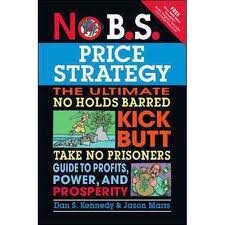Book Review: No B.S. Price Strategy
Any book that states on the first page, "price is a terrorist," is bound to grab your attention. It makes sense: price instills fear into sellers, and much of that fear is unwarranted. The other factor that impressed me immediately about this book was how the authors, Dan Kennedy and Jason Marrs, disagree that pricing and profit are about greed. They then suggest you read Ayn Rand's Atlas Shrugged, and Rabbi Daniel Lapin's Thou Shall Prosper (a fantastic book).Your prosperity is your price strategy. We'll never get paid more than we think we are worth. I like their line:
The other factor that impressed me immediately about this book was how the authors, Dan Kennedy and Jason Marrs, disagree that pricing and profit are about greed. They then suggest you read Ayn Rand's Atlas Shrugged, and Rabbi Daniel Lapin's Thou Shall Prosper (a fantastic book).Your prosperity is your price strategy. We'll never get paid more than we think we are worth. I like their line:
Go to the ocean with a teaspoon or bucket; the ocean doesn't care.
They make the point that the rich are paid in advance, whereas the poor are paid after they work.Another great insight is how the majority of customers want to make purchasing decisions on factors other than price—like, "It's good for my family," which is true for Michelin tires and even toilet paper.The importance of price integrity—similar to brand integrity—is a theme throughout the book.There are a few case studies that are very interesting. One by a Canadian doctor who has opted out of Canada's health care system in favor of a concierge-type model.Over 5,000 doctors in the USA have already done the same, and more are expected to do so if Obamacare remains the law of the land.The author's are on the same soapbox as VeraSage: There's no such thing as a commodity, and they offer several poignant and entertaining examples:
- Allen Brothers steaks: it places top steakhouse logos on its catalog pages, creating the framing effect of comparing its prices to that of dining out.
- Kennedy Barber Clubs, just for my dad and brother.
- MotoArt sells furniture made from real airline parts, obviously to a specialized customer segment.
- In 2009, Americans spent $45.5B on their pets, up 5.4% from 2008, and $3 million of that went to Doggles—sunglasses for your pets! We often say in our economics course that American's pets eat better than a lot of the world's poor.
- But my favorite has to be Kopi Luwak—cat-poo coffee. And you thought Starbucks was expensive.
The authors also deal with aspects of behavioral economics, especially the anchoring and framing effects.One interesting example is a chiropractor who has sold more treatments when patients were escorted from the waiting room to the examining room, rather than simply being called out.Differences and AnnoyancesJason Marrs brags about the hourly rates his therapists make relative to the competition. Yet he understands that customers buy results, not time or costs. I wonder if he's ever run across the labor theory of value?There's a comment made about how most recent trends are disadvantageous: our diet, chemical-laden foods, stress, etc. But then why are we living longer than ever before?One chapter mentions "intrinsic value," but other than life itself, there's no such thing. Because the book offers no theory of value, this is a shortcoming. But like Adam Smith, the authors may get some of the theory wrong, but they get the practice right.The authors also claim that .99¢ pricing works, but ignore evidence to the contrary. But they also believe in testing.I also have misgivings about Dan Kennedy's idea that your business is not about improving your customer's lives. He makes an interesting argument; I just don't find it persuasive (but I do totally agree that business is not about creating jobs, which is something you rarely see in a business book).After all, if business isn't about improving human beings, what's the point?The most annoying aspect of this book is the constant sales pitches for both author's websites, services, etc. This really grates on my nerves, and it will turn a lot of people off.Which is too bad, because this book is a worthwhile read.And, if after reading it, you say: "But my business is different!"—the authors rightly point out that this is the rallying cry of the poor.
